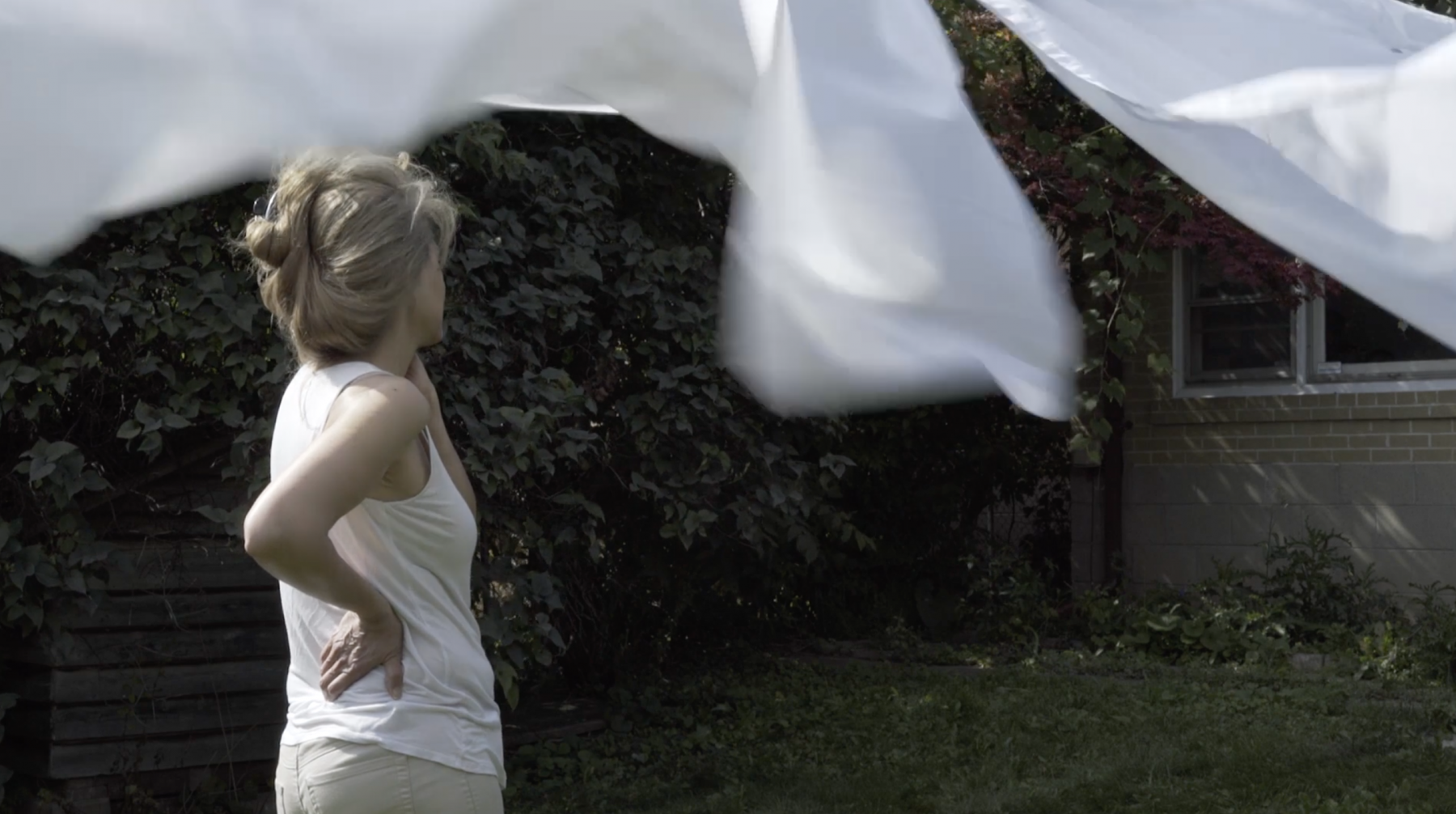gusts of sheets like lungs, breathing the air. dandelion leaves and blades of grass. dimpled fruit branches rustling like a horizon. between here and the pear tree—heat and the slowness of waiting. she says relationships between people are beautiful.
head held in creases and folds. deep watered intention or else a seething fury. nearby a woman crouched in a tree, a painted figure eating a fruit. pears piled high in a bowl, she says, I didn’t ask your opinion on being a woman.
white noise. white plaster hand, limp-wristed. a man with a cloth held in front of his face made of plaster. hands on her hip bone, sheets tangled up in the line. beside the sink, a window, yellow dish soap, a crumpled piece of paper towel.

I watch Toronto-based artist Sophie Sabet’s Though I Am Silent, I Shake (2017) over and over again on a loop, and as the video ends there is an unexpected switch: her mother’s body is replaced by her own body, laying in the same position. It’s a close-up on their collarbones, the collar of their t-shirts, the pulse of their blood seen on the skin of the neck. From this, I am feeling tenderness, humility, responsibility, but also the painful complexity of intergenerational inheritance, the thickness of that fabric.
It comes across as intensely personal, so I ask if sharing this work feels overly vulnerable, but Sabet says it hasn’t been an issue for her in the way people seem to expect. She says that in a lot of ways, she doesn’t really care what other people think about the work, “because I’m being honest. And you can’t really knock that down.”
Here and in Sabet's other works, art is held within domestic spaces, and in this way it feels inextricable from daily life—touched by the passage of time, and ever-altered by circumstance. The slow pace of the work is both intimate and tactile: speaking about physical fragility, concealment, grief, inter-generational work, misunderstanding, rupture, decay. Her depiction of home is rich and complicated in a way that I still don’t see enough of in the world. More often than not, domestic space is simplified and romanticized, or else it is not talked about at all—tidied away into the realm of the “private”—together with all of the invisible labour that holds it afloat.
Throughout the video, we see Sabet's mother, and her mother’s artworks—drawings, paintings, sculptures—in and around her family home, while listening to a subtitled conversation between the two of them, speaking in Farsi and English—Sabet asking her mother to describe an experience she had as a young artist in Iran, when an exhibition of her paintings was censored by the Ministry of Islamic Guidance. The conversation is punctuated with small ruptures of disagreement followed by silence, and Sabet describes how an earlier version of this work felt impersonal, empty because it left all of these moments out. “I kind of glorified this experience that (my mother) had, and left out all the parts that made me uncomfortable. I ignored everything she said about motherhood, and womanhood, because, honestly (at the time) it was too hard for me to hear… I’m a queer person in the world, and she does not agree with that. That is the undertone…”
Though these relationships are tumultuous, Sabet emphasizes that her parents are always willing to try, and in the process of making this work together, it has become clear how fluid their roles and identities really are, how everything between them shifts and changes over time. Since she began documenting their conversations in 2015, mid-way through her MFA, the process has offered a different perspective—a different lens for unpacking their relationship dynamics, their shared experiences, and accumulations of trauma. This work—Though I Am Silent, I Shake (2017)—is the second in a trilogy of works drawn from conversations between herself and her mother and her father: the first was Since We Last Spoke (2016) and the third will be I Almost Didn’t Feel You Leave (2019), to be exhibited at the Bradley Museum in Mississauga, ON, as part of Contact Photography Festival later this year. Through this series, Sabet continues to probe how migration has affected each of them differently, and how isolating all of their experiences have been.